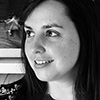"You have no idea what happens / when you make one creature out of another" (5). So this chapbook opens with the idea of Eve as a kind of bride of Frankenstein, a monster made only to solve the problem of Adam's loneliness. But this is only her beginning, her creation myth. In Aviya Kushner's Eve and All the Wrong Men, we follow Eve from poem to poem as she asks all the right questions: Is a woman's identity defined entirely by the men around her and their intentions for her? Her appetite for them? Or is there a life to be had entirely removed from men?
Possessed by her own desires (but with a critical eye), she wanders alone through a landscape of so many wrong men looking for a cure to their loneliness and the women who have found contentment in solitude. With simple, precise language, Kushner describes a longing that neither of these can satisfy: "with one look I am / connected to earth, / and with another / look I am not" (6). But maybe that is because this has always been a threesome—Eve, the wrong man, and God. Because someone is always left out in a love triangle—someone is always loved less.
As "a renovation, a remodeling / of an earlier thought" (5), Eve is a revised version of Adam—an improvement, a better design. Her voice within the poems—Eve's, Kushner's—is of a quiet kind of defiance, both bold and vulnerable. She observes her world with wonder, but there remains that unscratchable itch driving her both outward and inward.
Aviya Kushner's chapbook collapses the millennia between Genesis and the twenty-first century; and, in doing so, shows us how much has not changed in the experiences of women in all that time. Our loneliness—"wide as the Pacific" (27)—always pulls us, like a refrain, back to water, where some idea of God or love or self looms like an all-encompassing fog.
-
Issue 83
-
Editor's Note
-
POETRY
- Tory Adkisson
- Cynthia Atkins
- Simon Anton Niño Diego
Galera Baena - Daniel Barnum
- Nathan Blansett
- Julie E Bloemeke
- Daniel Bourne
- Jo Brachman
- Conor Bracken
- Christopher Citro
- Mary Crow
- Andy Eaton
- Jennifer Franklin
- Janlori Goldman
- Jose Hernandez Diaz
- Alison Hicks
- Michael Homolka
- Rogan Kelly
- Peter Kline
- Rodney Terich Leonard
- Thomas Mampalam
- Laura Marris
- Michael Montlack
- Amanda Moore
- Tanya Muzumdar
- Guimarães / Olsen
- Simon Perchik
- Sarah Perrier
- Megan Pinto
- Deborah Pope
- Denzel Xavier Scott
- Leona Sevick
- José Sotolongo
- Page Hill Starzinger
- Memye Curtis Tucker
- Laura Van Prooyen
- Hilary Varner
- John Sibley Williams
- Stella Wong
-
BOOK REVIEW
- Clara Burghelea reviews Word Has It
by Ruth Danon - Kim Jacobs-Beck reviews Civil Bound
by Myung Mi Kim - Lindsay Lusby reviews Eve and All the Wrong Men
by Aviya Kushner - David Rigsbee reviews The Anti-Grief
by Marianne Boruch
- Clara Burghelea reviews Word Has It
-
INTERVIEW
- Ruth Danon interviewed by Shauna Gilligan
Issue > Book Review
Lindsay Lusby reviews "Eve and All the Wrong Men" by Aviya Kushner
Eve and All the Wrong Men
by Aviya Kushner
by Aviya Kushner
pages
Dancing Girl Press
Buy this book through our Amazon.com bookstore and support The Cortland Review.
A poet, essayist, and translator, Aviya Kushner's first book The Grammar of God: A Journey into the Words and Worlds of the Bible, tackles a comparative reading of the Bible across languages: in Hebrew and in English. With her new chapbook of poems, Eve and All the Wrong Men from Dancing Girl Press, she returns again to this holy text and rewrites the story of Adam and Eve in the language of feminist dissent.



